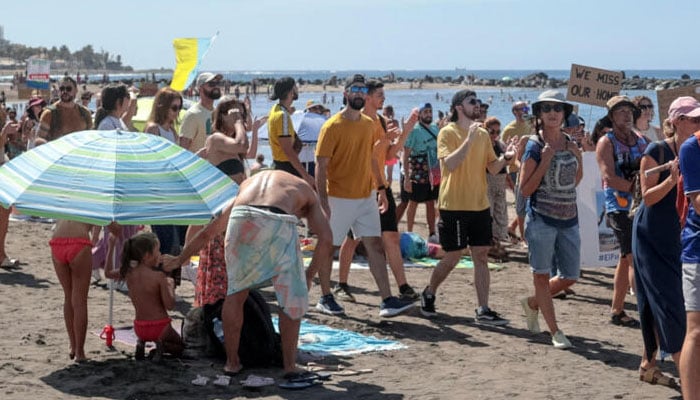Anti-migrant protests in Spain’s Canaries draw thousands
LAS PALMAS, Spain: Thousands took part in rallies in the Canary Islands main cities on Sunday against irregular migration that has seen a huge increase in boats washing up on its shores.
Located off the coast of northwest Africa, the Canary Islands are a particular target for people setting sail in badly equipped boats in search of a better life in Europe. Thousands have died attempting the perilous Atlantic crossing in recent years, while the islands´ government have said they cannot cope with the influx.
Protesters took to the streets of Gran Canaria´s Las Palmas and Tenerife´s Santa Cruz demanding action. “We are not racist, we´ve been too supportive, we are welcoming everyone who enters the country,” Zulema Ruiz, a demonstrator in Las Palmas told AFP.
“We cannot let our children go out into the street because we´re afraid they´ll be raped or stabbed,” the 37-year-old added. Eugenia Santana, 38, said demonstrators were “against mass and illegal immigration because it is affecting our health and education.”
Some protesters also carried placards critical of Spain´s Prime Minister Pedro Sanchez, who has advocated an approach that would see paths to legal immigration created. In July, lawyers asked the authorities to ban similar protests in the Canary Islands on the grounds that they could constitute a hate crime. The request was rejected, allowing the protests to continue.
Along with Italy and Greece, Spain is one of the three major European gateways for migrant arrivals. Despite the frequent deaths, the Atlantic route has gained in popularity as it is less policed than the Mediterranean.
Almost 40,000 migrants entered the Canary Islands in 2023, a record on course to be broken this year. Up to October 15, 32,878 irregular migrants arrived in the archipelago by sea, compared with 23,537 in the same period last year, according to Interior Ministry figures.
-
 South Korea: Two Killed As Military Helicopter Crashes During Training
South Korea: Two Killed As Military Helicopter Crashes During Training -
 Elon Musk Unveils SpaceX’s Moon-first Strategy With ‘self Growing Lunar City’
Elon Musk Unveils SpaceX’s Moon-first Strategy With ‘self Growing Lunar City’ -
 Donald Trump Slams Bad Bunny's Super Bowl Performance: 'Absolutely Terrible'
Donald Trump Slams Bad Bunny's Super Bowl Performance: 'Absolutely Terrible' -
 Jake Paul Criticizes Bad Bunny's Super Bowl LX Halftime Show: 'Fake American'
Jake Paul Criticizes Bad Bunny's Super Bowl LX Halftime Show: 'Fake American' -
 Prince William Wants Uncle Andrew In Front Of Police: What To Expect Of Future King
Prince William Wants Uncle Andrew In Front Of Police: What To Expect Of Future King -
 Antioxidants Found To Be Protective Agents Against Cognitive Decline
Antioxidants Found To Be Protective Agents Against Cognitive Decline -
 Hong Kong Court Sentences Media Tycoon Jimmy Lai To 20-years: Full List Of Charges Explained
Hong Kong Court Sentences Media Tycoon Jimmy Lai To 20-years: Full List Of Charges Explained -
 Coffee Reduces Cancer Risk, Research Suggests
Coffee Reduces Cancer Risk, Research Suggests -
 Katie Price Defends Marriage To Lee Andrews After Receiving Multiple Warnings
Katie Price Defends Marriage To Lee Andrews After Receiving Multiple Warnings -
 Seahawks Super Bowl Victory Parade 2026: Schedule, Route & Seattle Celebration Plans
Seahawks Super Bowl Victory Parade 2026: Schedule, Route & Seattle Celebration Plans -
 Keto Diet Emerges As Key To Alzheimer's Cure
Keto Diet Emerges As Key To Alzheimer's Cure -
 Chris Brown Reacts To Bad Bunny's Super Bowl LX Halftime Performance
Chris Brown Reacts To Bad Bunny's Super Bowl LX Halftime Performance -
 Trump Passes Verdict On Bad Bunny’s Super Bowl Halftime Show
Trump Passes Verdict On Bad Bunny’s Super Bowl Halftime Show -
 Super Bowl 2026 Live: Seahawks Defeat Patriots 29-13 To Win Super Bowl LX
Super Bowl 2026 Live: Seahawks Defeat Patriots 29-13 To Win Super Bowl LX -
 Kim Kardashian And Lewis Hamilton Make First Public Appearance As A Couple At Super Bowl 2026
Kim Kardashian And Lewis Hamilton Make First Public Appearance As A Couple At Super Bowl 2026 -
 Romeo And Cruz Beckham Subtly Roast Brooklyn With New Family Tattoos
Romeo And Cruz Beckham Subtly Roast Brooklyn With New Family Tattoos




